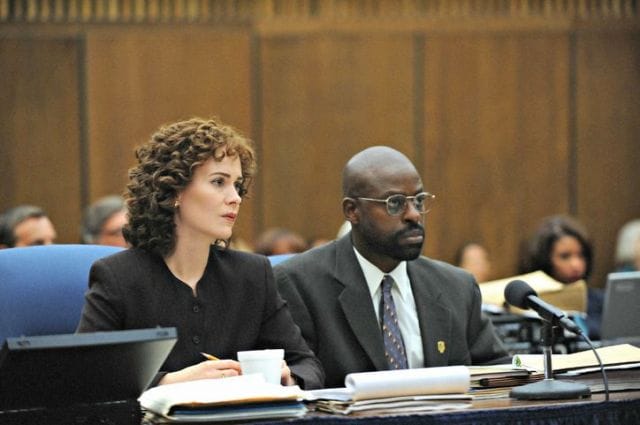Episodes: Darden and Clark, 4ever and ever

The People vs. O.J. Simpson (the first installment of FX's new limited series American Crime Story) is doing something I'm incredibly impressed by, something I'm not entirely sure I've ever seen pulled off to this degree before.
Marcia Clark and Christopher Darden, the murder trial's prosecutors, were not lovers. They probably didn't even have the sorts of long, yearning glances that People vs. O.J. has given them as a matter of course. But there were rumors, see, and it's not so very hard to give reality a little... push... to send it tumbling over into something else entirely.
Certainly, there have been historical love stories before, including some that are based on couplings that, uh, really didn't have a chance at existing (like, say, Pocahontas and John Smith). But People vs. O.J. is telling a story that purports to stick as close as possible to events that many, many people remember very, very well (with some time compression and dramatic license here and there), and it's sticking one of the best love stories of the TV season atop those very events. It's kind of remarkable!
But it's also amazing how much the show relies on us to take the baton. Yes, it gives us the longing looks and stolen moments that give every TV relationship the fuel it needs to survive. But because the show is bound by the historical record, it can only take us so far, and then it leaves us to our imaginations. To be sure, Sarah Paulson and Sterling K. Brown do some of the heavy lifting. But the show is using the grammar of shipping to get us to ship two people whom we know don't end up together.
Shipping is a curious thing, isn't it? It creates the idea that the foremost purpose of any work of art is to hook people up, but it also skews toward couples that can never be, whether because history or canon dictates as such.
And I think Clark and Darden are instructive as to why this is. People vs. O.J. suggests that their "love" story is, in essence, the story of two people versus the entire world, which takes arms against them. Which, ultimately, is how every really great love affair feels in the end, like the two of you are out there, on an island, and nobody else can enter that space alongside you. (When my wife and I fall into a state like this, my mom will just say, "They've gone somewhere else," which is as neat a summation of love as I can think of.)
Shipping a doomed couple on a TV show, then, is a kind of safe way to deal with a bunch of ways that real-life love disappoints, the ways that it inevitably turns into an impression of itself instead of the vivid thing it once was. We ship TV characters because we know that eventually, the love would sour, and the kids would annoy, and there would not be enough money. But on TV, we only have to see the good parts, the parts when it seems like nobody else might knock down the door, and like history might rewrite itself, so that the truest of lovers might find themselves together again.
--
Episodes is published at least three times per week, and more if I feel like it. It is mostly about television, except when it's not. Suggest topics for future installments via email or on Twitter. Read more of my work at Vox Dot Com.




